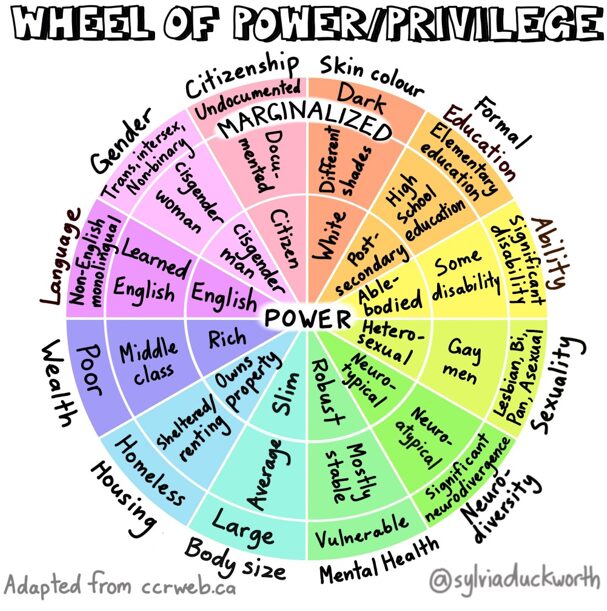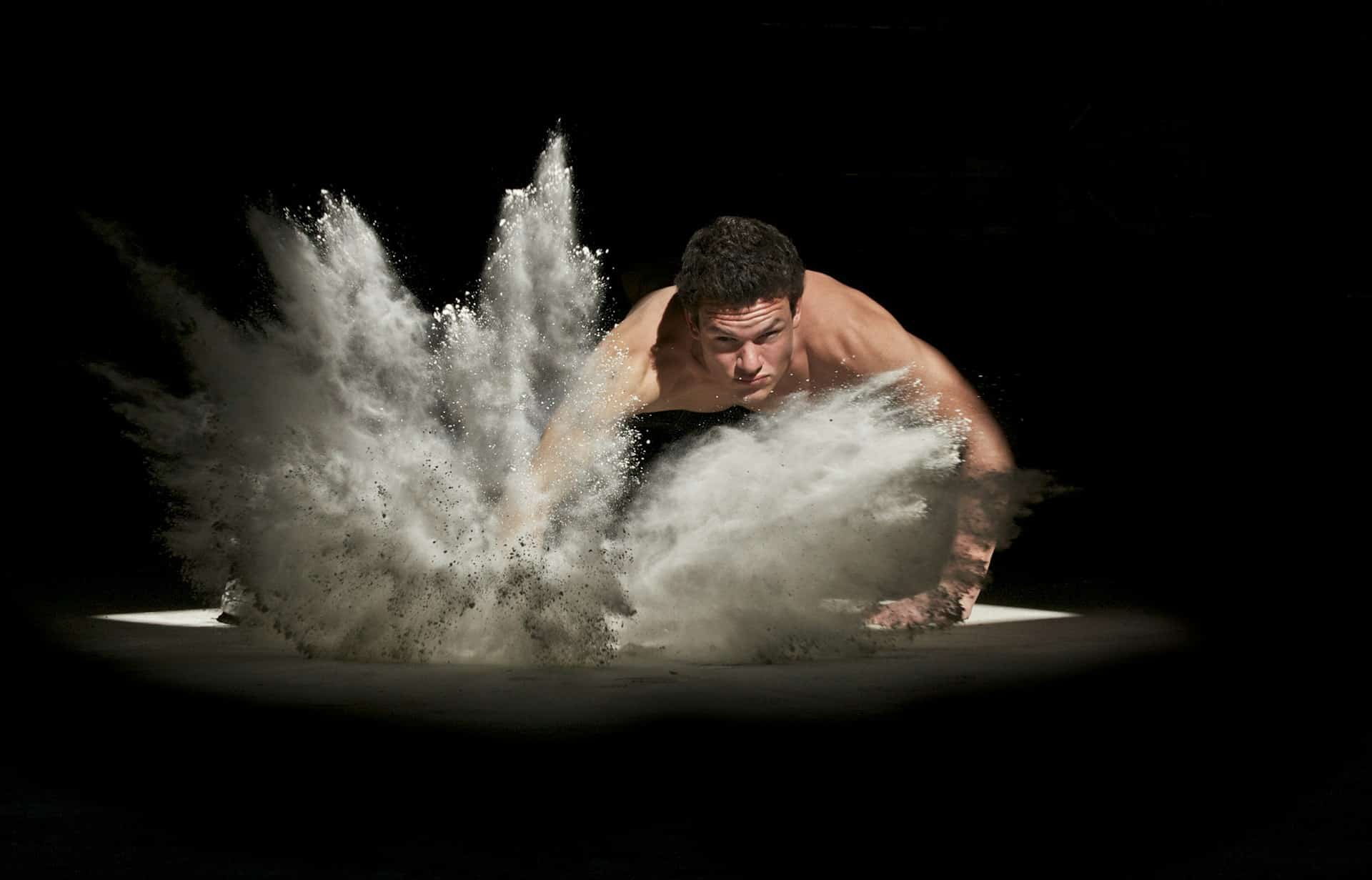- Happy Activism: A Sustainable Way to Create Change Without Burnout - February 9, 2026
- The Meaning of Critical Thinking: A Key Skill for Navigating Today’s Information Landscape - November 3, 2025
- Grandparents Can Develop Activist Grandchildren - September 29, 2025
Last Updated on November 2, 2025
Reflecting on your personal power and privilege is good for you. It is common for people who hold privilege to be defensive when others bring up the topic. And those with power often enjoy the advantages. Self-reflection can feel like a request to give your agency or power to other people. But examining your privilege and power is an exercise that can bring many gifts into your life. And make the world a better place for everyone. In this post, I will discuss power and privilege separately and how they are interconnected. I’ll show you the wheel of power and privilege. Then, I’ll offer ways you can improve your life with self-reflection.
Personal Power
I’m a credit union director and love serving this cooperative organization’s members. (Learn why you should choose a credit union over a bank. We recently changed our core hardware and software, a huge, multiyear project that finally came to fruition. The Board wanted to show how much we appreciated the extra work and stress that employees experienced. So, a group of us decided to deliver gourmet cookies and a thank you note to the main office and branches.
When we walked in the door, the employees looked distressed. We had not examined how it would look to employees if multiple directors entered the facility at the same time. Their immediate guess was that we were there to deliver bad news. Just walking in the door with the power provided by our director titles caused a negative reaction.
I understand power and even studied it in grad school, but it never occurred to me that we would cause this reaction. Our intent was positive, but the employees initially interpreted our presence as negative. Our lesson learned was to reflect on the power of our position as we interact with any employee, anytime.
This made me ponder the relationship between power and privilege and how we can all be aware.
Types of Power

As a credit union director, I have position power because I was elected to the position by the membership. Leaders carry position power over the people who work for them. Religious leaders also enjoy position power, too. Position power usually means you can give people things (reward power) or deny them things (coercive power.)
Some power comes from being an expert, the go-to person for important information. Connections to influential people provide power, too.
Using Power
Sometimes we enjoy having power. I’ve been a leader in a Fortune 500 company. I truly enjoyed my power to shape the department’s progress and help employees with their development goals. I found it fulfilling.
But there are downsides to power.
Even small amounts of power can affect our thoughts and feelings, driving us to engage in abuses of power. We are likely to feel entitled and less likely to feel empathy, even when we have no intention of abusing our power or entitlement.
Those with power can do good things, such as giving an employee a raise. The scary thing about power is that because it has the potential to influence, you do not have to actually use it to influence others. The day my group of directors walked into the credit union to do something good, the initial reaction from employees was that we were going to do something bad.
So, how does power relate to privilege?
Privilege
Privilege is a complicated concept. I like this definition from Miami University:
“Privilege is a system that gives unearned advantages, favors, and benefits to members of dominant groups at the expense of members of target groups, and it operates on personal, interpersonal, cultural, and institutional levels. In the United States, privilege is often granted to people who are members of particular identity groups, such as: White people, Able-bodied people, Heterosexuals, Males, Christians, Middle and upper-class people, Middle-aged people, and English-speaking people.”
Dr. Peggy McIntosh, who first researched privilege, described it
“as an invisible package of unearned assets that I can count on cashing in each day, but about which I was ‘meant’ to remain oblivious. White privilege is like an invisible weightless knapsack of special provisions, maps, passports, codebooks, visas, clothes, tools, and blank checks.”
Some people consider privilege a dirty word, one that people shouldn’t discuss. Those people likely hold a great deal of privilege and either consciously or unconsciously don’t like any attempts to usurp the power they hold.
Privilege can be earned or unearned. The problem of privilege relates to the unearned kind. Having unearned privilege makes it easier not to notice or deal with injustices that occur because of privilege and systemic power. Having privilege means you don’t have to think about its impact.

The Wheel of Power and Privilege
How are power and privilege different? Although both help us understand how people can influence others, the difference lies in whether the ability to influence is earned or unearned.
Generally, when someone holds privilege for something they earned, such as an advanced degree, no one has a problem with it. It is when unearned privilege, such as being a white person in the United States, allows us more potential to influence without having done anything to earn it. Being white is usually associated with power.
I found the Wheel of Power/Privilege enlightening because it highlights various ways people can have power.

Use the wheel of power and privilege to compare a person who identifies with everything in the middle to someone who identifies with everything in the outside ring of the wheel.
Even within a ring on the wheel of power and privilege, there is perceived power/privilege. A cisgender man holds more power than a cisgender woman, and a cisgender woman holds more power than those who identify as trans, intersex, or non-binary.
The reality is that most people identify with aspects of all three rings. And our privilege can change throughout our lives. For example, we might gain more education and potential power or lose power as we age.
Self-Reflection on Personal Power and Privilege: What’s in it for me?
I’m glad I spent the time to understand my areas of growth. It is a lifelong process but hugely rewarding for good relationships with others. Self-reflection on power and privilege offers you several personal and social benefits.
More Knowledge
Being open to reflection means you can learn about and enjoy other cultures. You can make better decisions because of your awareness of the impact of your actions on others. If you understand your cultural biases and assumptions you can gauge your skill and comfort level in dealings with others.
Greater Emotional Intelligence
Reflection allows you to expand your insight and emotional intelligence. You’ll recognize your biases, the unearned advantages you possess. This leads to more empathy and a better understanding of the challenges others face. Self-reflection can improve your interpersonal relationships because of more respectful interactions with others.
Personal Growth
Reflection can help you gain more purpose and inner peace in your life. When you better understand how you were socialized and how that impacts you, it opens you to be more compassionate, conscientious, and socially responsible. Those who are aware of their privileges are often more motivated to advocate for social justice. As a result, you’ll be proud of your legacy and make your grandchildren proud of you.
In summary, self-reflection on power and privilege is a powerful tool for your personal development. The bottom line is that self-reflection can enhance your life.
How to Reflect on Your Power and Privilege
Give yourself a gift and use self-reflection to better understand your personal power and privilege. You’ll be a better person for it.
Increase Your Knowledge
First, learn more about power and privilege. Wonderful resources are available to help you reflect on your power and privilege.
An easy start is to take the “How Privileged Are You?” quiz at BuzzFeed. I remember so clearly when I took this quiz because it felt like a seismic shift in my perception had occurred.
Use the Wheel of Power and Privilege to identify where you fall on each ring.
Another great resource is the Anti-Defamation League Personal Self-Assessment of Anti-Bias Behavior.
At the wonderful website, It’s Pronounced Metrosexual, you can find lists of situations that mean you have privilege. Here are examples:
- If you are male and have a bad day or are in a bad mood, people aren’t going to blame it on your sex.
- You can go to places with friends on a whim knowing there will be bathrooms there you can use if you identify with the gender you were assigned at birth.
- If you are white, you can find children’s books that overwhelmingly represent your race.
- People will congratulate you on an engagement if you are heterosexual.
- If you are non-disabled, you do not worry about the reactions of others to your needs.
Recommended Books:
- White Fragility: Why it is so hard for white people to talk about racism by Robin DiAngelo
- How to End Injustice Everywhere by Melanie Joy
Reflect on Your Learnings
Reflection Questions
- What power and privilege do I hold?
- How do my power and privilege impact my life?
Identify Areas for Growth
Remember that examination of power and privilege is a life-long process for everyone. However, you can identify areas where you can move forward with your understanding and incorporate new practices into your life.
Reflection Questions
- In what areas do I need to educate myself more, and where can I learn?
- What opportunities exist in my community to work with people from other cultures?
- How can I build new roles, practices, shared values, and relationships with others to counteract power and unearned privilege?
Healthy Relationships/Guidelines
Understanding your privilege and power and committing to better relationships is a wonderful goal. When interacting with others, use these guidelines for conversations about complex subjects.
If someone comments about your personal power or privilege, assume that their perspective is essential. Don’t talk about your perspective; keep focused on theirs. Listen and ask questions so you can learn from them.
If you are talking with someone about their power or privilege, treat them as you would wish to be treated. Give people the benefit of the doubt. They may not be aware of their privilege, or if they are, they may not have done the same self-reflection as you. Focus on behavior, not character or absolutes.
Moving Forward with Awareness
I know that reflecting on my privilege and personal power has made me a more thoughtful and caring person. And that the journey will continue. I am careful with any interaction with credit union employees, ensuring I am caring, cheerful, and supportive. I hope I present to them a person who volunteers for the credit union because she believes in the mission and always keeps the members’ needs as my guiding light.
And if more than one of us visits the credit union together, we’ll call ahead and give a heads-up.
READ NEXT
Cultural competence is critical in activism. Learn how to improve yours in Things You Should Know Before You Take It to the Streets.
Diane J. Goodman provides free resources on privilege and cultural competence.




